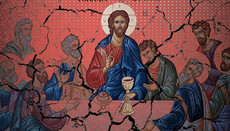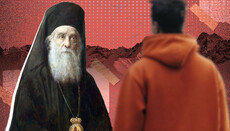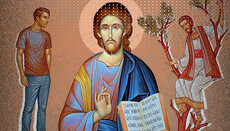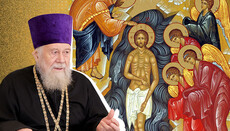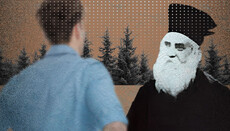Exchange of captives: who save people and who flash before cameras
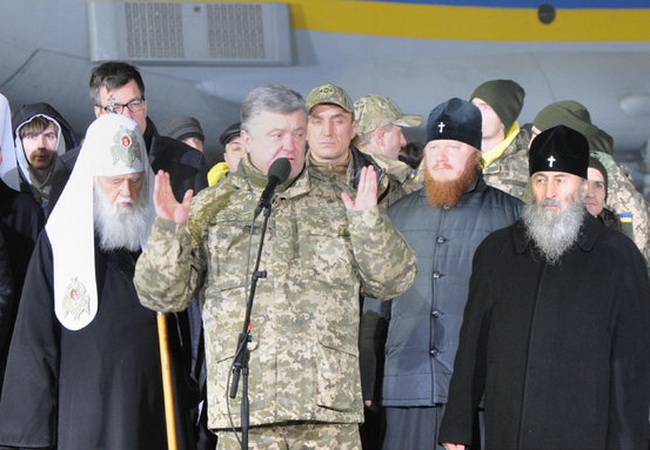
On Wednesday, December 27, there took place a large-scale exchange of prisoners in Donbass. Until the last moment it was on the verge of failure, therefore the Primate of the Ukrainian Orthodox Church Metropolitan Onufry called on all believers to pray so that this exchange could happen and all prisoners of war could be able to see in the Christmas holidays at home.
Apart from its significance, this event has caused a number of important questions: why had this exchange not taken place before? Whom do the former prisoners owe their release to? Who is trying to arrange a tinsel hype for this event? And who is working further on so that other prisoners, who still remain in captivity, will be released?
To begin with, let us recall the chronology of events related to the release of prisoners. The first exchange arrangements were reached on September 5, 2014 at a meeting of the contact group in Minsk. They were promptly implemented. On September 12, 14, 20, 21 and 28, 2014 exchanges of prisoners took place, after which the SBU reported that 468 citizens had been released from captivity, although this was a significant exaggeration.
Inspired by successes, the newly elected (at that thime) President Petro Poroshenko instructed to release all prisoners in the Donbas by the end of 2014: "I demand clear, coordinated work between the Security Service and the Ministry of Foreign Affairs on accelerating the return of our soldiers to their homes. We are tasked to have all those listed as prisoners (currently they are more than 600) come back home before Christmas." These words were just a bubble, inasmuch as Poroshenko’s pre-election promises to end the war within three days after being elected president.
On February 11-12, 2015, a meeting was held in Minsk in the "Norman format" at the highest level. The leaders of Russia, France, Germany and Ukraine held talks for almost 16 hours, which resulted in two documents. The first is a set of measures aimed at the implementation of Minsk agreements; the second is a declaration in support of this set, adopted by the leaders of the Norman Quartet. After that on February 21, 2015, a large-scale exchange of prisoners took place – 139 Ukrainian soldiers got exchanged for 36 representatives of the unrecognized republics. But this exchange became, in fact, the last major one. The reasons for this were explained by the leader of the Contact Group from Ukraine, former President Leonid Kuchma: "Today there is virtually not a single team at the state level that would deal with this problem, important for people."
This is important: Kuchma stated about the lack of the desire of the state (and perhaps the opportunities) to negotiate the exchange of prisoners and actually implement it.
Since then, exchanges of prisoners have been sporadic. No one spoke any more about Minsk agreements to exchange "all for all". Attempts by individual politicians or public figures to organize the exchange failed. Desperate to get help from the state, the relatives of the captured Ukrainian soldiers began to appeal to the Primate of the UOC, Metropolitan Onufry.
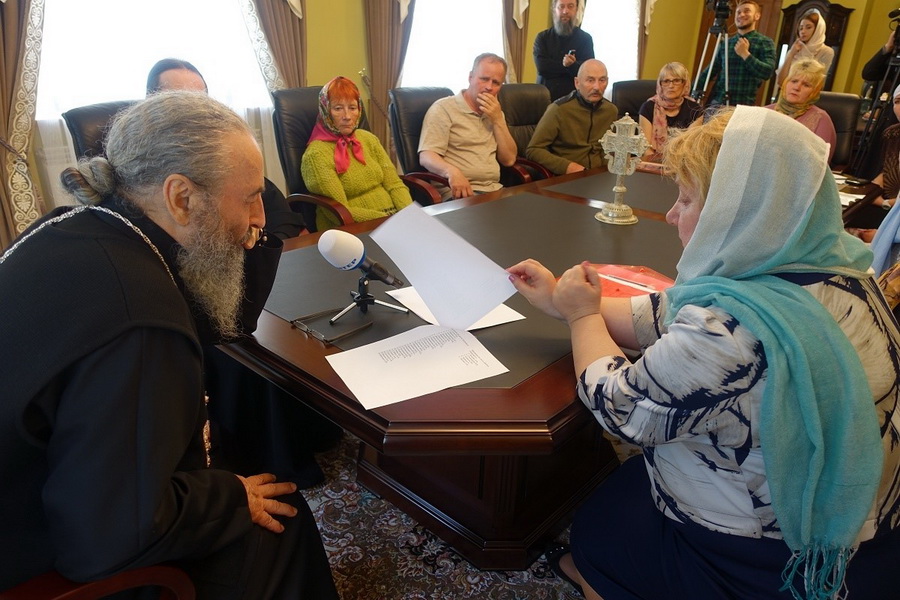
In 2016, at a meeting with the delegation of the All-Ukrainian Movement of Mothers and Relatives of Participants of Combat Operations Bereginya (“Guardian of the Hearth”), Metropolitan Onufry said: "We work a lot in this direction and we give petitions to bishops who perform their service in those regions. They turn to people on whom the release of prisoners depends. Something comes out, something does not. But we do not fall into despair. We will pray and do everything we can to ensure that those who are in captivity get released. The weapon of our Church is a request. We can only make requests. The Lord said, "Ask, and it will be given to you."
Why were the requests for the release of prisoners directed to the Ukrainian Orthodox Church and its Primate? The answer is obvious: because from the very beginning of the conflict the UOC refused to take sides on this war, and called for peace and brotherly love. The UOC did not abandon its flock either in the territory under the control of Kiev authorities, or in the territory of the unrecognized People's Republics of Donetsk and Lugansk. Despite persecutions and outright harassment in the media, the Church continued to carry its saving mission to people, no matter what side of the conflict they were.
On the contrary, the Uniates and the schismatics took a very tough politicized stance. It will just suffice to mention Mr. Denisenko saying that the inhabitants of Donbas suffer completely deservedly and must shed their blood for the "sin" of voting for the independence of LDNR. After such passages, after the calls for a "war to the victorious end," the representatives of both the UOC-KP and the UGCC for ever lost the opportunity for themselves to negotiate with the authorities of the unrecognized Republics, even through intermediaries. Therefore, despite all the statements and beautiful photographs, the merit of the UGCC and UOC-KP in the release of prisoners is zero. These structures and the words of their representatives are merely not perceived on the other side of the front line.
The UOC, on the contrary, proved that its consistent peacekeeping position, despite all the plights and attacks, is positively perceived on both sides of the conflict. All this time the UOC has pursued with the work so that the prisoners on both sides could return home to their families. The first positive result of its efforts was the release on December 18, 2016 of paratrooper of the 80th airborne brigade Taras Kolodiy from the two-year captivity, who had participated in the hostilities for Donetsk airport.
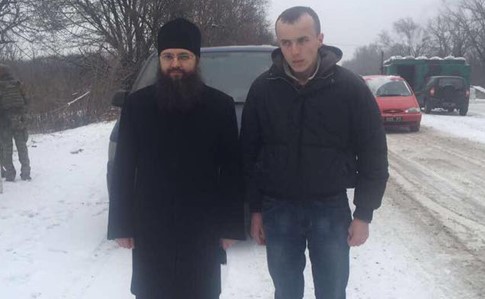
Bishop Kliment (Vecheria) and Taras Kolodiy after the release
An exceptional merit hereby belongs to the UOC, which was confirmed in particular by Advisor to the Chief of the Security Service of Ukraine Yuriy Tandit. Bishop Clement (Vecheria) when Kolodiy was set free said, "This is a holiday for all of us. We do not lose hope that we will have more holidays like this one." And the UOC carried its work on the organization of a large exchange of prisoners.
The scheme of such efforts was announced by the Moscow Patriarchate: "His Beatitude Metropolitan Onufry of Kiev and All Ukraine addressed His Holiness Patriarch Kirill of Moscow and All Russia with a request for assistance in the release of Taras Kolodiy, to whom, in their turn, the relatives of the above serviceman appealed as well. His Holiness Patriarch Kirill of Moscow and All Russia supported the petition of His Beatitude Metropolitan Onufry and addressed the persons on whom the positive decision on this matter depended. The liberation of Taras Kolodiy is the result of the peacekeeping participation of the Church in resolving the conflict in Ukraine, and also testifies to the high authority of the Ukrainian Orthodox Church. The prisoner was freed without any preconditions as an act of goodwill. The Russian Orthodox Church prays for the end of the fratricidal confrontation in Ukraine, considers it important to release the persons held by both sides as soon as possible, no matter where they would be.”
This press release deserves a separate comment. The only scheme of efforts to release prisoners is as follows:
- Relatives of the captives turn to Metropolitan Onufry.
- Metropolitan Onufry appeals to Patriarch Kirill.
- Patriarch Kirill deals with the “individuals on whom a positive decision on the matter in question depends.”
It should be noted that no structures other than the UOC have the possibility of such an address. Only the high authority of the UOC and personally its Primate is the key to the successful peacekeeping and humanitarian efforts.
Commenting on the release of Taras Kolodiy, Patriarch Kirill stressed that the Russian and Ukrainian Churches will never take sides in the ongoing conflict: "The church cannot be with one against the other. It ceases to be a Church; it becomes part of political power. If we are called to unite in order to oppose someone in Donbas – we cannot do it."
Back in November 2017 Metropolitan Onufry appealed to the Primate of the Russian Orthodox Church with a request to assist in the release of those prisoners of war who are still in captivity. And on November 15 Patriarch Kirill conveyed this request to the leadership of the Russian Federation. The result was a telephone call by Russian President Vladimir Putin to the leaders of the unrecognized People's Republics of Donetsk and Lugansk with a request to organize an exchange of prisoners.
Several times the process was in jeopardy. The final agreement was reached on Monday, December 25, at St. Daniel Monastery, where Patriarch Kirill met with leaders of the People's Republics and leader of the public movement "The Ukrainian Choice – is the People's Right" Viktor Medvedchuk.
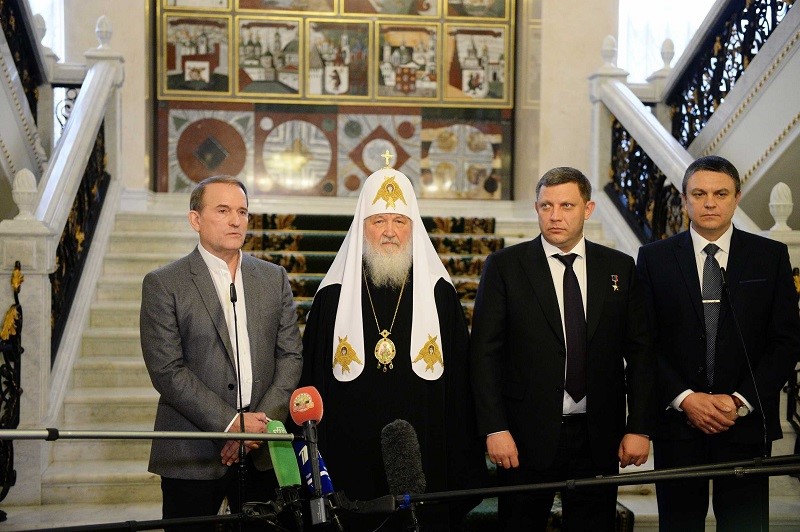
On December 27, the exchange finally took place. This has been the largest exchange of prisoners since the beginning of the conflict. The procedure was monitored by representatives of the OSCE Special Monitoring Mission and the International Committee of the Red Cross. Kiev transferred 233 persons to the self-proclaimed LNR and DNR against 73 who have returned to Kiev onto the territory under control.
The indicative moment, which social networks are talking about, but the Ukrainian media are silent (for obvious reasons): all these people, both on one side and on the other, are citizens of Ukraine. The fact of the exchange of Ukrainian citizens for Ukrainian citizens in the framework of the conflict in Donbas is a vivid confirmation that this conflict is a civil confrontation, which, except for Metropolitan Onufry and the UOC in general, just a few dare to say about.
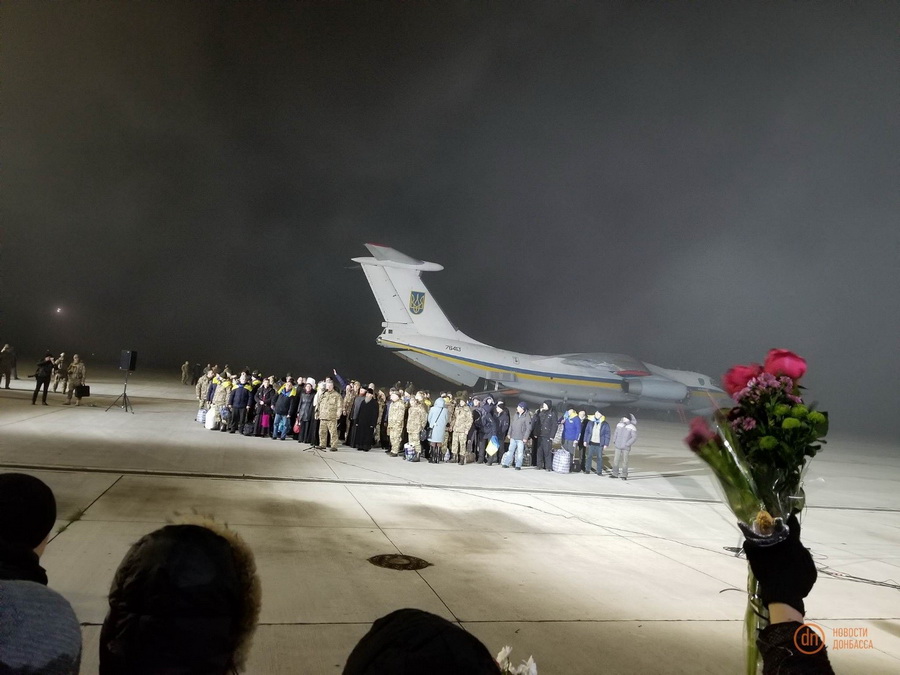
But in spite of the fact that the exchange occurred owing to the efforts of the UOC and the ROC, schismatics tried to settle in for the holiday.
Already at the "Major" military check point in Donetsk region, where the exchange of prisoners of war took place, the Ukrainian protocol service brought representatives of the UOC-KP and RCC with them, who have nothing to do with the exchange of prisoners. And at the airport of Kharkov they were in the spotlight along “the whole nine yards”!
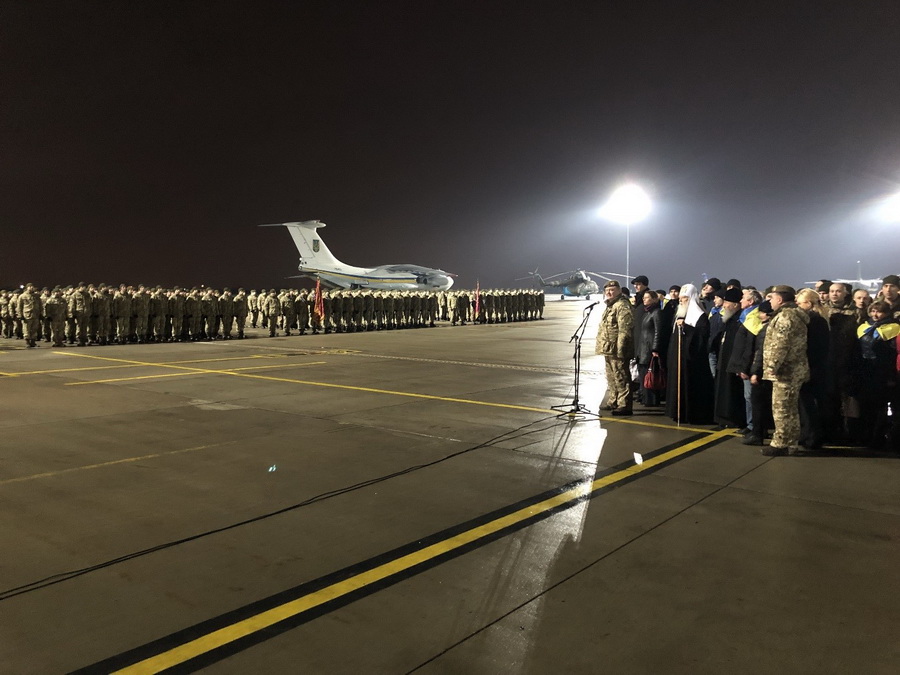
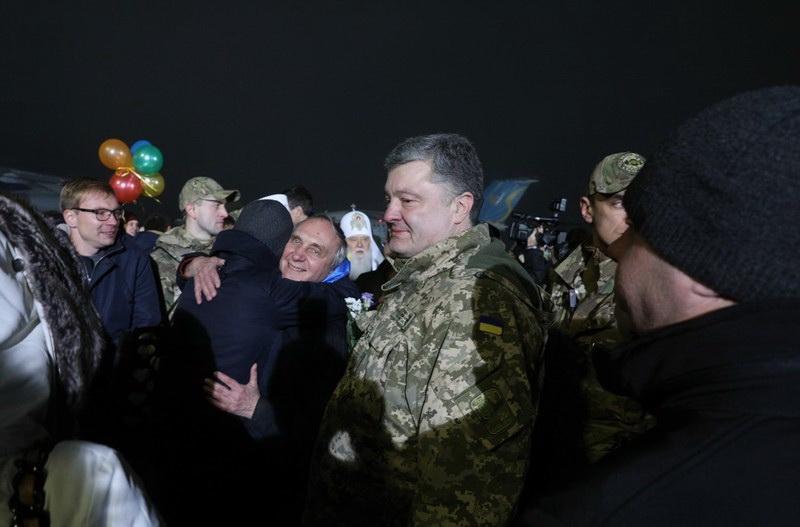
Mr. Denisenko made a fiery speech at the airport, where he did not fail to note his merit in this event: "In October the All-Ukrainian Council of Churches ... decided to address the Pope, the Ecumenical Patriarch, Patriarch Kirill of Moscow, the Archbishop of Canterbury, the World Council of Churches, the Conference of European Churches, the rabbis of Europe and the leaders of Muslims". The list was clearly not without a sense of humor. Does anyone really think that the release of prisoners is a merit of the rabbis of Europe or the Archbishop of Canterbury?
It is the clergy of the UOC that was directly involved in the exchange of captives and it is namely this participation that has allowed not to frustrate the process. "The priests of the UOC accompanied our soldiers who were in captivity during the whole process of exchange," Archbishop Clement (Vecheria) said. “Thanks to this, it was possible to maintain the agreements that have been reached, including the efforts of His Beatitude Metropolitan Onufry and His Holiness Patriarch Kirill. And despite the fact that today many politicians try to ascribe themselves to the laurels of the winners, this exchange would never have happened unless the UOC had acted as an intermediary for reaching these agreements on mass exchange."
Okay, let PR-avid politicians, schismatics and others acquire for themselves an image of benefactors at somebody else’s cost. The main thing is that people are released from captivity and will celebrate the Bright Nativity Holiday at home in the circle of their relatives and friends. As for the UOC, it will continue to work further on the release of prisoners. She has all the possibilities for this. The Chairman of the Board of the "Ukrainian politics" Fund political scientist Kost Bondarenko states, "The Orthodox Church has its own additional opportunities, which the state does not have. The UOC can act as a universal negotiator, having created a universal platform for the exchange of prisoners."
But the exchange of prisoners is not the only concern for the Ukrainian Orthodox Church: "I hope and I believe that this is so, that the exchange of prisoners is the first step to stop the war in Donbas,” said His Beatitude Metropolitan Onufry. "The first step, very important, has already been done. The wall that stood between us, the Ukrainians, and divided us into two parts has already been broken through. Though the wall is broken, may God allow us to have it destroyed.”
